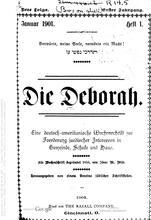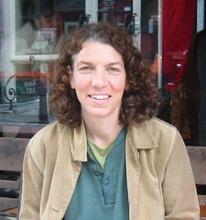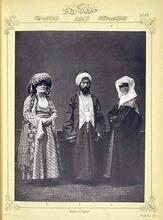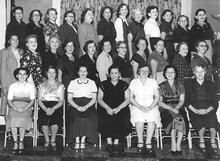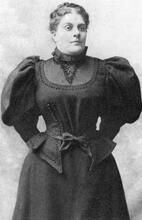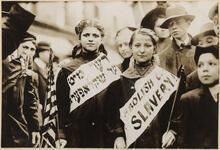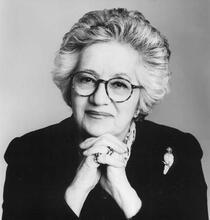Lillian Kasindorf Kavey
Lillian Kasondorf Kavey helped immigrants from Eastern Europe overcome bureaucracy and save the money to bring their families to the United States. In 1913, shey became the first woman granted a banking license in New York and opened her own official bank with her husband, and later their sons. In the 1930s, she secured affidavits for 125 Jewish families to immigrate to the United States, and beginning in 1923 she devoted decades to helping Ethiopian Jews by buying them farm equipment and lobbying for them to immigrate to Israel, laying the groundwork for later advocates. On a local level, she also founded the Jewish Community Center of Port Chester and created two boys’ clubs during World War II.
Lillian Kasindorf Kavey was a banker, a community activist, and an advocate for Conservative Judaism and Ethiopian Jewry. She was born in New York City on July 19, 1889, and married Abraham H. Kavovitz, an itinerant clothing merchant and shoe salesman, in 1908. They settled in Port Chester, New York.
Career and Banking
Ambitious, intelligent, and indomitably energetic, Lillian Kavovitz, as she was called at that time, opened a pawnshop and loan office that served the European immigrants who worked in the town’s factories. After learning that many immigrants hoarded money in lumpy mattresses to bring over their next of kin, she decided to help overcome the bureaucracy at both ends and transformed her business into a loan company and a travel agency. Customers left money with her to gather interest. When sufficient funds accumulated, Kavey prepared the tickets and arranged passage with the steamship companies for her clients’ relatives. When newcomers had difficulties with immigration authorities, she would travel on their behalf to Ellis Island, where she soon became a familiar figure.
Port Chesterites trusted Kavey, whose linguistic talents matched her business acumen. She conversed with her clients in Russian, Polish, German, and Czech. To accommodate Italians, her largest group of clients, a local Catholic priest, Father Meyerhoffer, tutored her in several Italian dialects.
In 1913, Kavey became the first woman to be granted a banking license in New York State. Encouraged by his wife’s success, Abraham Kavovitz sold his dry-goods business in 1916 and helped found a private bank that bore both of their names: The A.H. and L. Kavovitz Bank. When two sons joined their parents in business in 1940, they changed the name of the family as well as the business. Kavey and Sons remained a private bank handling loans, savings accounts, and transfers of funds to foreign countries. The bank survived until 1955, when it merged with a larger local institution and, ultimately, Barclays Bank.
Judaism and Advocacy
Kavey was very active in Jewish and general local communal affairs. First as advocate for youth, then as the paramount founder of the Jewish Community Center of Port Chester, she personally sponsored two clubs for teenaged boys in the interwar period. During World War II, she corresponded with the young men and extended moral and material support. At the same time, she convinced local Italians and African-Americans to establish centers for their youth based on the Jewish model.
An early champion of Conservative Judaism in the suburbs, Kavey convinced the sisterhood of Congregation Kenesses Tifereth Israel to affiliate with the Women’s League for Conservative Judaism and the congregation to sponsor late Friday evening services on a Conservative model, even as Saturday morning services retained their immigrant ambiance. Beyond Port Chester, she raised funds for the Jewish Theological Seminary and convinced sisterhoods throughout metropolitan New York to join the Women’s League.
During Baltic and Mediterranean vacations in the late 1930s, Lillian and Abraham Kavey urged Jewish businesspeople to leave their lands of residence. They filed affidavits for 125 families from Egypt, Morocco, Italy, Poland, and Scandinavia.
After meeting the Orientalist Jacques Faïtlovitch in 1923, Kavey devoted more than fifty years to helping Ethiopian Jews. With Rabbi Israel Goldstein, she was a vocal advocate of their cause before the Italian invasion of 1936. During the 1960s and early 1970s, she visited Gondar, Ethiopia, three times, succeeded in getting some black Jews moved to more arable land, and then contributed money for three tractors. Efforts to transfer large numbers of Ethiopian Jews to Israel, however, ran into opposition from the Israeli rabbinate. In this endeavor, as in her commercial, philanthropic, and communal activities, Kavey was a herald of future trends.
Lillian Kasindorf Kavey died on May 10, 1986, in Port Chester, New York.
Kavey, Lillian Kasendorf. “The Falashas Revisited.” Woman’s League Outlook 39 (Fall 1968): 18–19.
Shargel, Baila R., and H.L. Drimmer. The Jews of Westchester: A Social History (1994).

